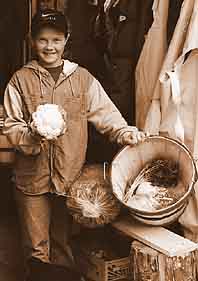 At Suffolk Farms, the good food's in season all
year
At Suffolk Farms, the good food's in season all
year
When the O'Halloran family Pat, Lena and Emily moved to the Sandpoint area from warmer climes, one of the first things they did was look for a good place to buy organic food. They soon discovered that North Idaho's short growing season only allowed for fresh local produce about four months of the year.
Used to a year-round supply, Pat decided to do something about it.
He built a huge commercial greenhouse on his land a few miles northeast of Sandpoint, and began to grow his own. While waiting for the crops to take hold, he used the Internet to find certified organic food sources from all over the country, and began to import seasonal fruits and vegetables for use in off-months.
He put several of his acres into hay, some into spuds all certified organic and established a flock of about 460 free-range chickens to supply meat and produce eggs.
Suffolk Farms was born. The name comes from the O'Halloran's big farm horses Suffolks that Pat uses to work his land as much as possible. "They aerate the ground and don't compact it like a tractor," Pat says, although he does make use of a tractor, too.
Pat also came up with the idea of deliveries. Folks who sign up receive a weekly half-bushel basket of what's growing or has arrived at the time. A sample of a typical basket last spring included two-three giant carrots, kiwis, navel oranges, Mutsu apples, and Bosc pears; one or two red Rio grapefruit, several Roma tomatoes and Yukon gold potatoes, one beautiful large cauliflower, a bunch of parsley, a bag of mixed salad greens, and a bag of green beans. Customers may also request eggs, honey, or even a dressed or live chicken. Summer baskets typically contain cucumbers, spinach, chard, tomatoes, peppers whatever's in season.
Everything of course, is done organically. Ladybugs and honey bees are free to do their work unimpeded by chemicals or poisons. Songbirds can eat insects, and meadowlarks can build their nests in the fields without the dangers of pesticides or herbicides to adulterate their diet. And the lucky folks who reap the culinary rewards of all this effort can savor each bite, knowing it's chemical-free.
- Valle Novak